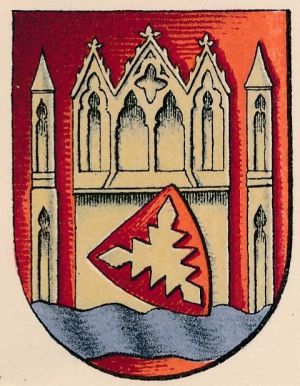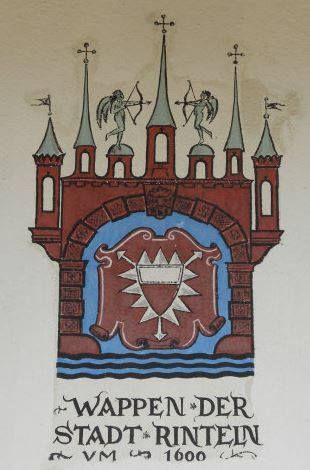Rinteln: Difference between revisions
Knorrepoes (talk | contribs) m (Text replacement - "{{media}}" to " {{de1}} {{media1}}") |
Knorrepoes (talk | contribs) m (Text replacement - "{{de}}" to "") |
||
| Line 1: | Line 1: | ||
'''RINTELN''' | '''RINTELN''' | ||
Revision as of 05:14, 27 December 2022
RINTELN
State : Niedersachsen
District (Kreis) : Schaumburg
Additions : 1974 Ahe, Deckbergen, Engern, Exten, Friedrichswald, Goldbeck, Hohenrode, Kohlenstädt, Krankenhagen, Möllenbeck, Schaumburg (1929 Ostendorf, Rosenthal), Steinbergen, Strücken, Uchtdorf, Todenmann, Volksen, Wennenkamp, Westendorf
| German |
Über einem blau-silbernen Fluss im Schildfuß eine dreitürmige silberne Burg im roten Felde, im Tor auf Rot ein silbernes Nesselblatt. |
| English | No blazon/translation known. Please click here to send your (heraldic !) blazon or translation |
Origin/meaning
The arms were officially granted in 1939.
Rinteln received city rights in 1239 from Count Adolf IV of Schaumburg-Holstein. The oldest seal dates from the second half of the 13th century and shows the arms of the Counts of Schaumburg-Holstein, the Nesselblatt, or nettle-leaf. Later seals show already the above combination with the Nesselblatt in a gate above waves, the latter symbolising the Weser river. Although all seals show the same composition, the size and shape of the different elements has changed often during the centuries.
| The arms in an 1884 book |
The arms seen in the town (image Klaas Padberg Everboer) |
| The arms by Hupp in the Kaffee Hag albums +/- 1925 |
Literature: Stadler, 1964-1971, 8 volumes; Hupp, O: Kaffee Hag albums, 1920s



